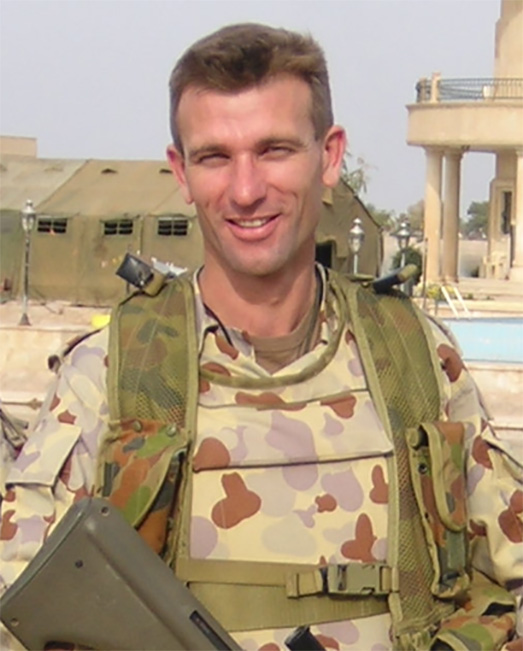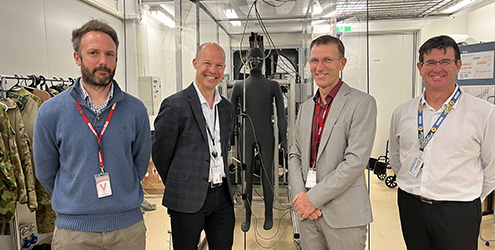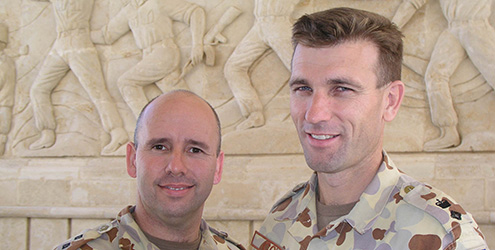Future student
Copyright@ Australian Catholic University 1998-2026 | ABN 15 050 192 660 CRICOS registered provider: 00004G | PRV12008
Copyright@ Australian Catholic University 1998-2026 | ABN 15 050 192 660 CRICOS registered provider: 00004G | PRV12008

It’s a Sunday morning in late autumn of 2006 and Andrew Condon, a commander in the Australian Army, is heading off to his daughter’s under-12s soccer match in suburban Sydney. On the way there, he’s tuned in to ABC News Radio with a keen ear for the latest news on a powerful earthquake in Yogyakarta, Indonesia.
“I was always attuned to see what disasters were breaking around the world, knowing that if the Australian Government was going to send a military option, I would likely be part of it,” says Condon, who joined the army in 1982.
Unfortunately, the news is bad. The magnitude 6.4 earthquake appears to have done serious damage, with early casualties on the island of Java. Given the devastation that had occurred two years earlier when the Boxing Day tsunami hit the Indonesian province of Aceh, regional authorities are ready to act swiftly.
“So we get to the oval and I’m half expecting a phone call telling me that I’ve been deployed, and to make things even more interesting, it turns out that I’m rostered on to be the parent-referee for the first half of the game.”
Minutes into the match, Andrew Condon is racing down the field with a whistle in his mouth when he feels his mobile phone ringing in his pocket. He stops to take a peek and sees it’s the operations officer from the Victoria Barracks in Sydney.
“He’s calling me from his desk phone, not his mobile, and I’m thinking, ‘Oh gee, he’s at work. I better pick this up’,” Condon recalls. “I answer the phone and say to him, ‘You’ve got to be quick because I’m reffing a soccer game’. And he says, ‘Oh, I don’t know if you’ve heard about Yogyakarta, but we need you in here right away’. So I wave goodbye to my daughter, throw my whistle to another parent, tell my wife that I’ve been called into work and I’ll let her know when and if I’m coming home, throw her the car keys, and I race off to hail a taxi.”
This experience, and many others like it, give Andrew Condon a first-hand understanding of not only what it’s like to serve in the armed forces, but also the effect that service can have on the families of defence personnel.
“They live with a level of uncertainty around when their defence family member is leaving and when they’re coming back, and in some cases, the extreme risk they’re exposed to while they’re away, and that can be very difficult for families to deal with,” says Condon, who served in the army for 27 years.

Andrew Condon visits the Defence Science Technology Group, 2022
As ACU's Industry Professor for Veterans and Their Families, Condon has been tasked to improve higher education opportunities for serving armed forces personnel, and help veterans and their family members make a successful transition into post-service life.
In February 2022, a week after his appointment, ACU announced it would expand its entry scheme for veterans – an initiative that converts military training and education to a selection rank for ACU courses – to include their immediate families. The program, believed to be the first of its type in Australia, recognises the impact on the family members of those who have served.
“It’s a recognition that while these partners and children didn’t necessarily deploy overseas in volatile situations, they didn’t go away for months on end for training or deployment, they nonetheless had to endure considerable challenges while their spouse or parent did those things,” he says.
“We’re recognising those sacrifices and acknowledging that we have a moral obligation to ensure these family members can also transition into whatever comes next for them.”
Raised on his grandfather’s soldier settlement farm in Yenda, in the Riverina district of New South Wales, Andrew Condon approached his final year of school with a plan to study engineering.
“I was pretty set on it but we were in the middle of a drought,” he says. “The only way I was going to do engineering was if I picked up a scholarship.”
He looked around at various opportunities and came across a scholarship at the Royal Military College in Duntroon, and in 1985, he graduated with a mechanical engineering degree from the University of NSW.
Condon’s military career included several civil secondments, including as an engineer with a missile manufacturer in Germany. He saw active service in Iraq and made operational visits to Timor, Syria and elsewhere.
Since retiring from the Defence Force in 2009, he has worked in a string of professional roles in the veteran sector. For eight years, he was CEO of Sydney Legacy, a not-for-profit that supports families of incapacitated and deceased veterans. He was a director on various boards, served as chair of RSL LifeCare, and was a member of the Prime Ministerial Advisory Council on Ex-Service Matters.
Then, in late 2021, Condon received an offer he couldn’t refuse with an organisation that is shaping itself to be the university of choice for military personnel.

Andrew Condon in Iraq in April 2004 with Padre Ivan Grant.
“This role at ACU really speaks to my passions around what we can do for veterans and their families,” says Condon, the university’s first-ever Industry Professor to serve in the role.
“I’ve always been a strong believer that education is a key pathway for enhancing and enriching people’s lives, and the ultimate outcome here is that we offer Australian veterans an opportunity to access that pathway.”
This desire to help fellow Australians stems from what Andrew Condon recalls as his most rewarding experience while serving in the army.
It was another sudden crisis situation in 2006, when thousands of Australian citizens were stranded in the middle of an escalating war between Israel and Hezbollah forces in Lebanon.
With less than a day’s notice, Colonel Andrew Condon was deployed as the commander of Operation Ramp, a joint taskforce with a mission to support the evacuation of 5,000 Australians from the conflict zone.
Though complex and fraught with risk, the operation was successful, and Condon was later awarded the Conspicuous Service Cross in the 2007 Queen’s Birthday honours for his achievement. He insists, however, that the sense of fulfilment he felt at helping fellow Australians was reward enough.
“You were actually helping Australians, and I found that to be a special privilege,” says Condon, who wrote about Operation Ramp in 2007 for the Australian Army Journal.
“That experience has lived with me ever since. It has given me the motivation and the drive to do more in this space, to help fellow Australians in need, and that’s what I’m drawing on here at ACU, when I’m working on delivering on the task to support those who have served for our country.”
Throughout his career, Andrew Condon has had several of what he calls “higher education touchpoints” that have acted as a bridge from one opportunity to another.
As well as his engineering degree, Condon is a graduate of the Royal Military College of Science in the UK, and the US Army Command and General Staff College, and spent a year as visiting fellow at the University of Sydney. He has also been active in research, leading the widely-cited Ex-Service Organisation mapping project in 2015.
Higher education has been “a massive contributor” to his career, he says, and he feels privileged to have had these opportunities. He believes that the talent, skills and knowledge of defence veterans is a largely untapped resource; one that could be of benefit to organisations in many realms of society.
“The attributes that veterans gather through their training and deployment allow these young individuals to thrive in the most extraordinary of circumstances,” Condon says. “As a society, we should be leveraging that and harnessing it in a way that is beneficial to these veterans themselves, but also to the wider community.”
For many veterans, he adds, higher education is the key to a successful and dignified transition to civilian life.
“We want to give these Australians the chance to live enriching lives through learning and knowledge-gathering, to be job-ready and able to access opportunities, and to be active members of a flourishing society that can see their potential, and that values their contributions.”
Are you a current or former member of the Australian Defence Force who is keen to pursue university study? Explore your options at ACU.
Copyright@ Australian Catholic University 1998-2026 | ABN 15 050 192 660 CRICOS registered provider: 00004G | PRV12008